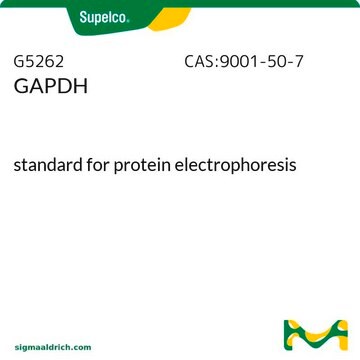G7526
Glutaraldehyde solution
Grade I, 8% in H2O, specially purified for use as an electron microscopy fixative or other sophisticated use
Synonym(s):
Glutaric dialdehyde solution, Pentane-1,5-dial
About This Item
Recommended Products
Quality Level
type
Grade I
form
liquid
concentration
8% in H2O
technique(s)
electron microscopy: suitable (fixative)
color
colorless
solubility
water: soluble at 20 °C
shipped in
dry ice
storage temp.
−20°C
SMILES string
[H]C(CCCC([H])=O)=O
InChI
1S/C5H8O2/c6-4-2-1-3-5-7/h4-5H,1-3H2
InChI key
SXRSQZLOMIGNAQ-UHFFFAOYSA-N
Looking for similar products? Visit Product Comparison Guide
Application
- Optical-transparent and flexible glucose sensor with ITO electrode.: This paper presents the design and testing of an innovative optical-transparent and flexible glucose sensor, which includes an Indium Tin Oxide (ITO) electrode, for enhanced performance and usability in medical diagnostics (Mitsubayashi K et al., 2003).
Other Notes
Signal Word
Danger
Hazard Statements
Precautionary Statements
Hazard Classifications
Acute Tox. 4 Inhalation - Aquatic Chronic 3 - Eye Dam. 1 - Resp. Sens. 1 - Skin Corr. 1B - Skin Sens. 1 - STOT SE 3
Target Organs
Respiratory system
Supplementary Hazards
Storage Class Code
8A - Combustible corrosive hazardous materials
WGK
WGK 3
Flash Point(F)
Not applicable
Flash Point(C)
Not applicable
Personal Protective Equipment
Choose from one of the most recent versions:
Certificates of Analysis (COA)
Don't see the Right Version?
If you require a particular version, you can look up a specific certificate by the Lot or Batch number.
Already Own This Product?
Find documentation for the products that you have recently purchased in the Document Library.
Customers Also Viewed
Related Content
Three-dimensional (3D) printing of biological tissue is rapidly becoming an integral part of tissue engineering.
Three-dimensional (3D) printing of biological tissue is rapidly becoming an integral part of tissue engineering.
Three-dimensional (3D) printing of biological tissue is rapidly becoming an integral part of tissue engineering.
Three-dimensional (3D) printing of biological tissue is rapidly becoming an integral part of tissue engineering.
Our team of scientists has experience in all areas of research including Life Science, Material Science, Chemical Synthesis, Chromatography, Analytical and many others.
Contact Technical Service







